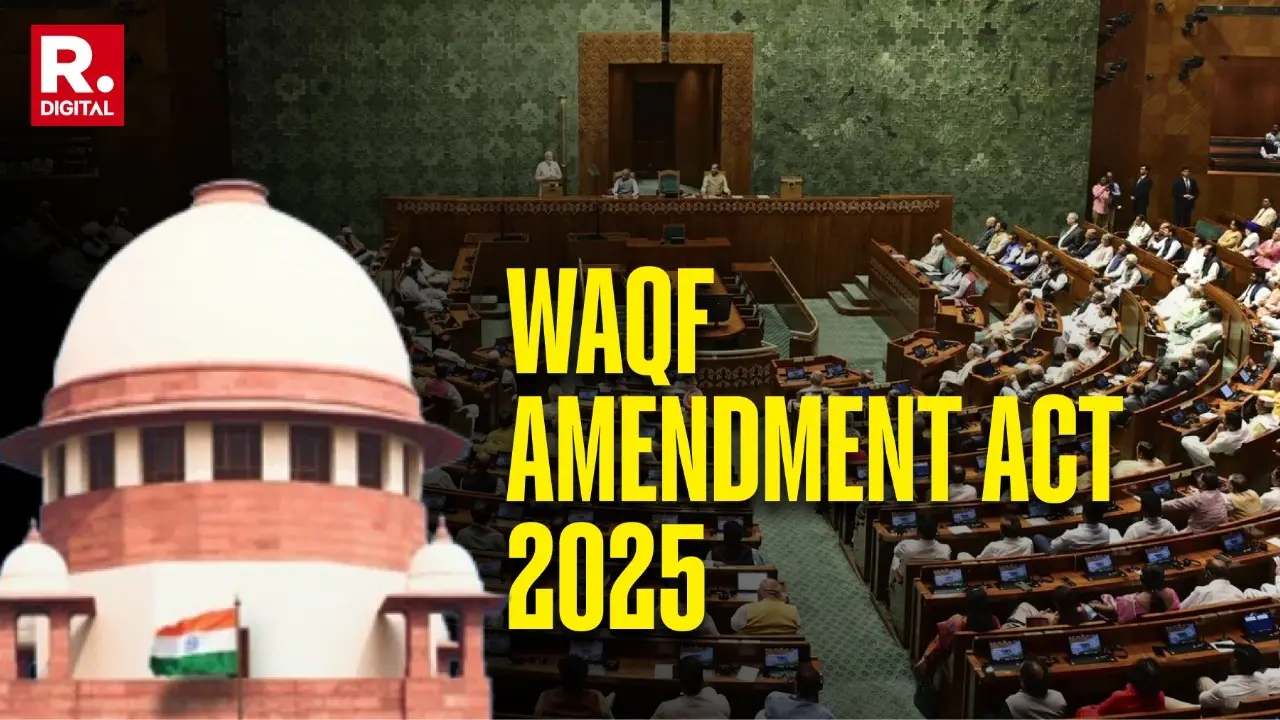Updated 16 April 2025 at 17:08 IST
Article 26 Is Secular, Applies to All: Supreme Court on Waqf Act Petitions | What Transpired During Hearing
Supreme Court heard pleas challenging Waqf (Amendment) Act, 2025; petitioners cite violations of Articles 14, 25, 26, and 300A of the Constitution.
- India News
- 3 min read

New Delhi: The Supreme Court on Wednesday heard a batch of petitions challenging the constitutional validity of the Waqf (Amendment) Act, 2025. A bench led by Chief Justice of India Sanjiv Khanna, along with Justices Sanjay Kumar and KV Viswanathan, took up the matter with over 70 petitions listed before the court.
During the proceedings, Chief Justice Khanna observed that Article 26 of the Constitution is secular in nature and applies uniformly across all communities, regardless of faith. His remark came in response to arguments presented by Senior Advocate Kapil Sibal, who was representing one of the petitioners.
Sibal contended that the amended law infringes upon religious freedoms protected under Articles 25 and 26, particularly targeting Islamic practices.
"Inheritance in Islam occurs after death; they are now interfering even before that," he said, questioning the state's authority in matters of religious inheritance. “Who is the State to tell us how inheritance will be in my religion?” Sibal asked, challenging the very basis of the amendment.
Advertisement
The hearing in the apex court also focused on Section 3(C) of the amended Act, which allows government property to be identified or declared as waqf.
Sibal flagged the absence of a statutory time limit within which such declarations can be made. “They can make a declaration claiming it as waqf property, and there is no time frame for this process,” he argued. Sibal further submitted that appointing a government officer to oversee such designations is “per se unconstitutional.”
Advertisement
Appearing for the Centre, Solicitor General Tushar Mehta defended the legislation, stating that it underwent extensive scrutiny by a Joint Parliamentary Committee. "The committee held 38 sittings, visited several cities, and examined lakhs of suggestions. After consultations, the Bill was passed by both Houses," Mehta told the bench.
However, multiple senior advocates continued to press for a stay on the Act. Senior Advocate Rajeev Dhawan argued that the amendment violates the fundamental right of Muslims to practice their religion, adding that charity is an essential religious practice under Islam. Senior Advocate Abhishek Manu Singhvi also appeared for one of the petitioners and urged the court to stay the implementation of the Act.
During the hearing, CJI Khanna recalled his time at the Delhi High Court, saying, "We were told that the land is Waqf land. Don’t misunderstand us… we are not saying all Waqf by user is wrongly registered." The bench noted that the issue is nuanced and that claims of Waqf over land should not be dismissed outright.
In a significant observation, the Supreme Court also said it could consider directing a single High Court to hear the matter, so the case could benefit from a detailed High Court judgment before proceeding further.
Prominent political figures and organisations have joined the challenge against the Waqf (Amendment) Act, 2025. Petitioners include AIMIM MP Asaduddin Owaisi , Congress MP Md Jawed, RJD MP Manoj Kumar Jha, and TMC MP Mahua Moitra, along with religious and civil society bodies such as the All India Muslim Personal Law Board, Jamiat Ulema-i-Hind, and the Dravida Munnetra Kazhagam (DMK).
Others challenging the Act include the Indian Union Muslim League, YSR Congress Party, Samastha Kerala Jamiatul Ulema, Delhi MLA Amanatullah Khan, SP MP Zia Ur Rehman, the Imam of Jama Masjid Bengaluru, the Communist Party of India, the Association for Protection of Civil Rights, and TVK President and Tamil actor Vijay.
On the other hand, the states of Rajasthan , Gujarat , Haryana , Maharashtra , Assam , Uttarakhand, and Chhattisgarh have submitted intervention applications in support of the legislation. The Central Government has also filed a caveat.
Get Current Updates on India News, Entertainment News, Cricket News along with Latest News and Web Stories from India and around the world.
Published By : Surabhi Shaurya
Published On: 16 April 2025 at 15:10 IST
